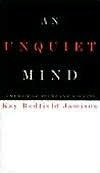More on this book
Community
Kindle Notes & Highlights
The major clinical problem in treating manic-depressive illness is not that there are not effective medications—there are—but that patients so often refuse to take them.
It is an illness that is biological in its origins, yet one that feels psychological in the experience of it;
I had a terrible temper, after all, and though it rarely erupted, when it did it frightened me and anyone near its epicenter.
I would read the same passage over and over again only to realize that I had no memory at all for what I just had read. Each book or poem I picked up was the same way. Incomprehensible. Nothing made sense. I could not begin to follow the material presented in my classes, and I would find myself staring out the window with no idea of what was going on around me. It was very frightening.
During these agitated periods I became exceedingly restless, angry, and irritable, and the only way I could dilute the agitation was to run along the beach or pace back and forth across my room like a polar bear at the zoo.
It was my first lesson in appreciating the complicated, permeable boundaries between bizarre and original thought,
Decreased sleep is both a symptom of mania and a cause,
There was a neuronal pileup on the highways of my brain, and the more I tried to slow down my thinking the more I became aware that I couldn’t.
It is devastating to have the illness and aggravating to have to pay for medications, blood tests, and psychotherapy. They, at least, are partially deductible. But money spent while manic doesn’t fit into the Internal Revenue Service concept of medical expense or business loss. So after mania, when most depressed, you’re given excellent reason to be even more so.
Sex became too intense for pleasure, and during it I would feel my mind encased by black lines of light that were terrifying to me.
How many hours of sleep had I been getting? Did I have any problems in concentrating? Had I been more talkative than usual? Did I talk faster than usual? Had anyone told me to slow down or that they couldn’t make sense out of what I was saying? Had I felt a pressure to talk constantly? Had I been more energetic than usual? Were other people saying that they were having difficulty keeping up with me? Had I become more involved in activities than usual, or undertaken more projects? Had my thoughts been going so quickly that I had difficulty keeping track of them? Had I been more physically
...more
in learning to distinguish the roles of lithium, will, and insight in getting well and leading a meaningful life. It was the task and gift of psychotherapy.
Some of my reluctance, no doubt, stemmed from a fundamental denial that what I had was a real disease.
It was difficult to give up the high flights of mind and mood, even though the depressions that inevitably followed nearly cost me my life.
I tend to compare my current self with the best I have been, which is when I have been mildly manic. When I am my present “normal” self, I am far removed from when I have been my liveliest, most productive, most intense, most outgoing and effervescent.
When I got particularly toxic I would start trembling, become ataxic and walk into walls, and my speech would become slurred;
It was a loopy but intense life: marvelous, ghastly, dreadful, indescribably difficult, gloriously and unexpectedly easy, complicated, great fun, and a no-exit nightmare.
When I was manic, the tempo seemed slow; when I was normal, frenetic seemed fine; when I was depressed, the pace was impossible.
Normal people are not always boring.
It is not an illness that lends itself to easy empathy.
At that point, in an icy and imperious voice that I can hear to this day, he stated—as though it were God’s truth, which he no doubt felt that it was—“You shouldn’t have children. You have manic-depressive illness.”
Science remains quite remarkable in its ability to raise new problems even as it solves old ones.
Most physician suicides are due to depression or manic-depressive illness, both of which are eminently treatable.
Physicians, unfortunately, not only suffer from a higher rate of mood disorders than the general population, they also have a greater access to very effective means of suicide.
“If we got rid of all of the manic-depressives on the medical school faculty, not only would we have a much smaller faculty, it would also be a far more boring one.”
The milder manias have a way of promising—and, for a very brief while, delivering—springs in the winter and epochal vitalities.


